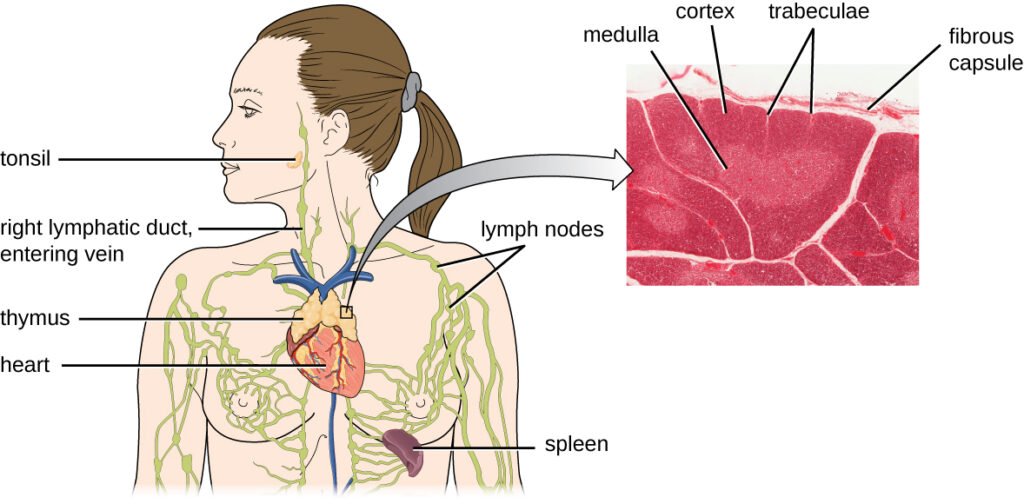Table of Contents
Welcome to the exploration of a small yet mighty organ nestled within our chest – the thymus gland. Often overshadowed by its more prominent counterparts, the thymus plays a pivotal role in the development and training of a key player in our immune system: T lymphocytes or T cells. As a crucial component of the lymphatic system, the thymus orchestrates a delicate dance, fostering the maturation of immune cells that serve as guardians against pathogens and abnormalities within the body. Join us on a journey through the anatomy, functions, and significance of the thymus gland, delving into the intricacies of its role in shaping our body’s defense mechanisms.
From its unique structure to its vital contribution to immune health, the thymus gland invites us to appreciate the elegance of nature’s design in fostering our resilience against the challenges that may arise. Let’s unravel the mysteries of the thymus gland, acknowledging its unsung importance in maintaining our body’s immune harmony.
ANATOMY

The thymus is a specialized organ of the immune system located in the upper part of the chest, just behind the sternum. It is a crucial component in the development and maturation of T lymphocytes, which are essential for adaptive immune responses.
The thymus gland undergoes significant changes in structure and function over a person’s lifetime, with its most active phase during childhood and adolescence. Its anatomy comprises several key features:
- Lobes and Lobules: The thymus consists of two lobes, each further divided into lobules. These lobules contain a cortex and a medulla, each playing a distinct role in the maturation of T cells.
- Cortex: The outer region of the thymus is the cortex, where T cell maturation begins. Cortical thymic epithelial cells, along with dendritic cells and macrophages, provide the microenvironment necessary for the early stages of T cell development.
- Medulla: Deeper within the thymus gland, the medulla is where more mature T cells migrate. Medullary thymic epithelial cells, along with dendritic cells, assist in the final stages of T cell maturation and the elimination of self-reactive T cells through a process called negative selection.
- Thymic Corpuscles: Unique structures found in the medulla, thymic corpuscles are concentrically arranged and are thought to be involved in the maturation process and the elimination of non-functional T cells.
- Blood Supply: The thymus receives its blood supply primarily from branches of the internal thoracic arteries. Blood vessels bring nutrients and oxygen to support the metabolic needs of the developing T cells.
- Lymphatic Drainage: Lymphatic vessels carry lymph away from the thymus gland, helping to transport immune cells and waste products.
The thymus gland is most active during childhood and adolescence, playing a critical role in the education and maturation of T cells. As individuals age, the thymus undergoes a process of involution, where its size decreases, and its function diminishes. Despite this involution, the thymus continues to contribute to T cell development throughout adulthood.
T cells produced in the thymus migrate to various lymphoid tissues, such as the spleen and lymph nodes, where they play essential roles in immune responses. The thymus’s role in T cell maturation is crucial for establishing a diverse and functional immune system capable of recognizing and responding to a wide range of pathogens while maintaining tolerance to self.
FUNCTION
The thymus gland, though relatively small in size, plays a crucial role in the development and maturation of T lymphocytes or T cells, a vital component of the immune system. The primary functions of the gland include:
- T Cell Maturation: The thymus gland is the primary site where T cells mature and differentiate. T cells undergo a complex process of education and selection within the thymus, ensuring that they can identify and respond to specific antigens without attacking the body’s own cells.
- Training and Selection: T cells produced in the bone marrow migrate to the thymus for further development. Within the thymus, immature T cells undergo a process of positive and negative selection. Positive selection promotes the survival of T cells that can recognize and bind to foreign antigens, while negative selection eliminates T cells that may react against the body’s own tissues.
- Immune Surveillance: Once educated and selected in the thymus, mature T cells leave the thymus and circulate in the bloodstream, patrolling various tissues and organs. These T cells are instrumental in immune surveillance, identifying and responding to foreign invaders, infected cells, or abnormal cells within the body.
- Adaptive Immune Response: T cells are key players in the adaptive immune response, mounting specific and targeted attacks against pathogens such as viruses, bacteria, and other foreign substances. The thymus ensures the T cells possess the ability to recognize a diverse range of antigens, enhancing the adaptability of the immune system.
- Immune System Coordination: The thymus contributes to the coordination of the immune response by fostering communication between different immune cells. This orchestration ensures an effective and regulated defense against infections and diseases.
- Hormone Production: The thymus produces hormones known as thymosins, which play a role in the maturation and differentiation of T cells. Thymosins also contribute to the regulation of the immune system.
- Early Immune Development: The thymus is more prominent and active during childhood, gradually decreasing in size and activity as individuals age. It is particularly crucial in the early years of life for the establishment of a robust immune system.
DISEASES

Diseases affecting the thymus gland are relatively uncommon, but they can have significant implications for the immune system. Some conditions associated with the gland include:
- Thymomas: Thymomas are tumours that originate in the thymus. These tumours can be benign (non-cancerous) or malignant (cancerous). Thymomas are rare but can cause symptoms such as chest pain, coughing, and difficulty breathing. They may also be associated with autoimmune disorders.
- Thymic Hyperplasia: Thymic hyperplasia is an enlargement of the thymus, often caused by an overactive immune response or autoimmune disorders. It can lead to an increased production of T cells.
- Myasthenia Gravis: Myasthenia gravis is an autoimmune disorder where the immune system mistakenly attacks receptors on muscle cells, leading to muscle weakness and fatigue. The thymus is often involved in myasthenia gravis, and thymomas are more common in individuals with this condition.
- Thymic Cysts: Thymic cysts are fluid-filled sacs that can form in the thymus. They are usually benign and may not cause symptoms. However, they may require medical attention if they become large or cause discomfort.
- DiGeorge Syndrome: DiGeorge syndrome is a genetic disorder characterized by the incomplete development of the thymus and other structures in the body. It can lead to immune deficiencies and a range of health issues.
- Thymic Aplasia (Absent Thymus): Thymic aplasia is a condition where the thymus gland fails to develop properly. This can result in severe immune deficiencies and an increased susceptibility to infections.
- Pure Red Cell Aplasia (PRCA): PRCA is a rare disorder characterized by a failure of the bone marrow to produce red blood cells. In some cases, the thymus may be involved, and thymectomy (surgical removal of the thymus) is sometimes considered as part of the treatment.
- Hypogammaglobulinemia: Hypogammaglobulinemia refers to low levels of immunoglobulins (antibodies) in the blood, leading to an increased susceptibility to infections. Thymus dysfunction may contribute to immune deficiencies seen in this condition.
It’s important to note that thymic disorders are relatively rare, and many individuals with thymus-related conditions can lead healthy lives with appropriate medical management. Diagnosis and treatment often involve a combination of medical history, imaging studies, and, in some cases, biopsy or surgical intervention. Individuals experiencing symptoms or conditions related to the thymus should seek medical attention for proper evaluation and management.
HEALTHY THYMUS GLAND

Maintaining a healthy thymus gland involves adopting practices that support overall immune system health. While specific strategies directly targeting the thymus are limited, general lifestyle choices contribute to immune function and overall well-being. Here are some tips to promote a healthy thymus gland:
- Balanced Diet: Eat a nutritious and balanced diet rich in fruits, vegetables, whole grains, lean proteins, and essential vitamins and minerals. Nutrients such as vitamin C, vitamin D, and zinc are particularly important for immune function.
- Regular Exercise: Engage in regular physical activity to support overall health. Exercise helps improve circulation, reduces inflammation, and contributes to a strong immune system.
- Adequate Sleep: Ensure you get sufficient and quality sleep. Sleep is essential for immune system function and the production of immune cells.
- Stress Management: Practice stress-reducing techniques such as meditation, deep breathing, yoga, or other relaxation methods. Chronic stress can negatively impact immune function.
- Hydration: Stay well-hydrated by drinking an adequate amount of water. Proper hydration supports overall health, including immune function.
- Avoid Smoking and Excessive Alcohol: Smoking and excessive alcohol consumption can have negative effects on the immune system. Quitting smoking and moderating alcohol intake contribute to overall health.
- Sun Exposure: Ensure moderate sun exposure for the synthesis of vitamin D, which is crucial for immune function. However, always use sun protection to prevent excessive sun damage.
- Healthy Weight Maintenance: Maintain a healthy weight through a balanced diet and regular exercise. Obesity can contribute to inflammation and negatively impact immune health.
- Regular Check-ups: Schedule regular health check-ups with a healthcare provider to monitor overall health and address any potential issues promptly.
- Good Hygiene Practices: Practice good hygiene, including proper handwashing, to reduce the risk of infections that could affect the immune system.
- Avoid Overuse of Antibiotics: Use antibiotics judiciously and as prescribed by healthcare professionals. Overuse can lead to antibiotic resistance and may affect the balance of the immune system.
- Limit Exposure to Environmental Toxins: Minimize exposure to environmental toxins and pollutants that could potentially impact immune health.
In conclusion, the thymus gland, though small and often overlooked, plays a vital role in shaping the body’s immune defenses. As the primary site for T cell maturation, the thymus orchestrates a delicate dance, ensuring the development of immune cells capable of recognizing and responding to foreign invaders. While maintaining the health of the thymus gland directly may be limited, adopting a lifestyle that supports overall immune system function contributes to its well-being indirectly. From a balanced diet and regular exercise to stress management and adequate sleep, these practices promote resilience against infections and contribute to a robust immune response.
As we appreciate the intricate role of the thymus in immune health, let us embrace habits that foster not only the well-being of this unsung hero but also the overall vitality of our body’s defense mechanisms.

